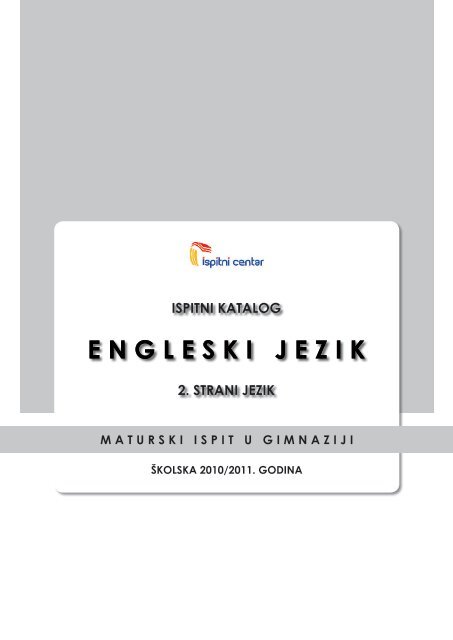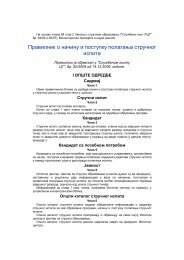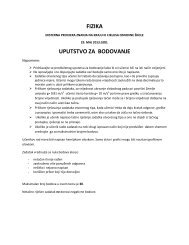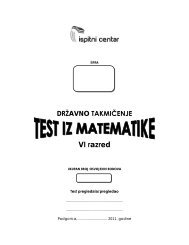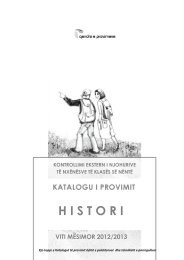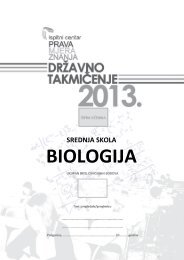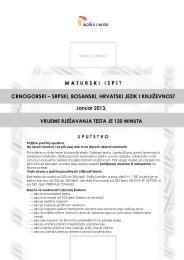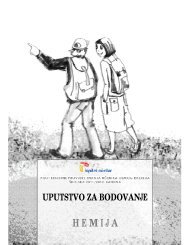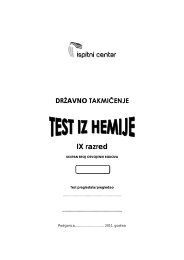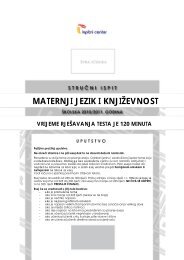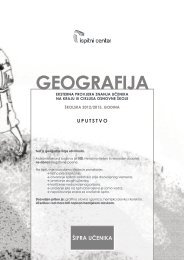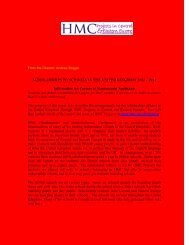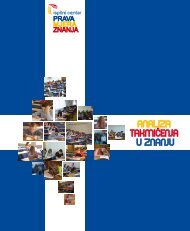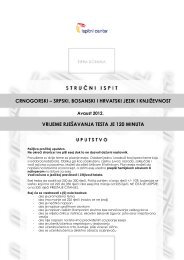You also want an ePaper? Increase the reach of your titles
YUMPU automatically turns print PDFs into web optimized ePapers that Google loves.
ISPITNI KATALOGE N G L E S K I J E Z I K2. STRANI <strong>JEZIK</strong>M A T U R S K I I S P I T U G I M N A Z I J IškolSKA 2010/2011. GODINA
Ispitni katalog pripremili:doc. dr Igor Lakić, Institut za strane jezikeFadila Kajević, Zavod za školstvoJadranka Grbović, Gimnazija „Slobodan Škerović“ - PodgoricaSnežana Brajović, SŠ „Ivan Goran Kovačić“ - Herceg NoviDivna Paljević Šturm, Ispitni centar
SADRŽAJ1. Uvod.....................................................................................................................................42. Opšti ciljevi ispita.................................................................................................................53. Struktura ispita......................................................................................................................64. Ispitni program.....................................................................................................................64.1. Teme.....................................................................................................................64.2. Jezički sadržaji.....................................................................................................74.3. Ispitni ciljevi........................................................................................................95. Primjer testa.......................................................................................................................10Pravila....................................................................................................................101. Slušanje..................................................................................................................112. Čitanje...................................................................................................................133. Gramatika i leksika..............................................................................................174. Pisanje...................................................................................................................206. Rješenje testa i način ocjenjivanja.................................................................................227. Literatura............................................................................................................................26
1. UvodDržavna matura uvodi se školske 2010/11. godine u obrazovni sistem Crne Gore ipredstavlja standardizovanu eksternu provjeru školskih postignuća učenika na krajučetvorogodišnjeg gimnazijskog obrazovanja. Na osnovu Zakona o gimnaziji (“Sl. listRCG”, br. 64/02 od 28. 11. 2002, 49/07 od 10. 08. 2007, “Sl. list Crne Gore”, br. 45/10 od04. 08.2010), maturski ispit polaže se eksterno (član 38), a za pripremu ispitnih materijala isprovođenje procedure državne mature zadužen je Ispitni centar Crne Gore.Ispitni katalog detaljno opisuje eksterni ispit iz Engleskog jezika kao drugog stranog jezika.Namijenjen je učenicima i nastavnicima. U Ispitnom katalogu navedeni su opšti ciljeviispita, struktura ispita i sadržaj koji će se ispitivati. Ponuđen je primjer testa sa shemom zaocjenjivanje.4
2. Opšti ciljevi ispitaIspitni ciljevi zasnovani su na jezičkim kompetencijama definisanim predmetnimprogramom.Lingvističke kompetencije: poznavanje stranog jezika na nivou morfologije, sintakse, semantike, leksike ina tekstualnom nivou i osposobljenost za pismeno sporazumijevanje.Sociolingvističke kompetencije: sposobnost razumijevanja tekstova s obzirom na njihovu namjenu ivantekstualne okolnosti u kojima se odvija komunikacija; vladanje primjerenim načinima pismene komunikacije.Diskursna kompetencija: poznavanje strategija koje učenicima omogućavaju da ostvarujukomunikaciju u pisanom obliku (organizuju, strukturiraju i prilagođavajuporuku).Poznavanje strategija rješavanja problema u komunikaciji: poznavanje strategija za rješavanje nesporazuma i savladavanje preprekau sporazumijevanju.Sociokulturološka znanja: poznavanje važnih aspekata društva i kulture zemalja engleskog govornogpodručja i svijest o sličnostima i razlikama između svijeta u kojem žive i onogkoji upoznaju kroz učenje engleskog jezika.5
3. Struktura eksternog ispitaPismeni ispit iz Engleskog jezika sastoji se iz četiri područja: slušanja, čitanja, gramatike ileksike i pisanja. Bez obzira na broj pitanja, svako područje donosi jednak broj od ukupno100 bodova.DioPodručje/vrijemeSadržajTip zadatkaUdio utestu1Slušanje15 minuta2 zadatka dijalog izlaganje višestruki izbor alternativni izbor kratak odgovor25%2Čitanje30 minuta2 zadatka tekstovi do 800 riječi(pismo, brošura,novinski članak,reportaža) višestruki izbor alternativni izbor povezivanje ređanje kratak odgovor25%3 Gramatikai leksika30 minuta3-4 zadatka leksika gramatika test zatvorenog tipa test otvorenog tipa transformacija rečenicagrađenje riječi25%4Pisanje45 minuta2 zadatka: kratka poruka(40 - 50 riječi) pisanje sastava(100-120 riječi)e-mail poruka formalno i neformalnopismo, članak, izvještaj,priča, sastav u komeiznosi argumente za iprotiv nekog gledišta25%4. Ispitni program4.1. TEME1. Porodica, dom i okruženje2. Odnosi u porodici i društvu3. Slobodno vrijeme i razonoda4. Obrazovanje5. Ishrana6. Zdravlje7. Kupovina8. Putovanja9. Uslužne djelatnosti10. Aktuelna zbivanja i društvo11. Klima i vremenski uslovi6
4.2. JEZIČKI SADRŽAJIR I J E Č IImenice regular and irregular plural forms, plural only/singular only, foreign plural countable & uncountable Genitive: ‘s, ‘ , double genitive, Saxon genitive with measures, timeexpressionsZamjenice personal pronouns demonstrative pronouns (this, these, that, those) possessive pronouns relative pronouns (who, whom, that, which, whose) interrogative pronouns reflexive/emphatic pronouns indefinite pronouns (somebody, anything, everybody...)Član indefinite article a/an, definite article the, zero articleKvantifikatori some, any, no, every, much, many, several, few, a few, little, a littleGlagoli Verb forms Present Simple Present Continuous Past Simple Past Continuous Present Perfect Present Perfect Continuous Past Perfect Future forms▪ will + V▪ be going to + V▪ Present Simple▪ Present Continuous▪ Future Continuous R▪ Future Perfect Simple R Past Perfect Continuous R Sequence of Tenses Question Tags Imperative Causative have/get I wish (present & past time reference), I wish/If only + S + would used to be used to Modal auxiliaries and modal auxiliaries equivalents (can, could, must, will, would, need, shall, should may, might, have to, be able to, be allowed to) modals + perfect infinitive Passive Voice▪ Passive Voice (all tenses)▪ Passive Voice with O dand O i▪ passive infinitive: to be V -ed/en▪ passive gerund: being V -ed/en▪ It + passive + that clause (it is believed that…) Multi-part verbs Gerund or Infinitive7
Verbs followed by V -ingand infinitives verbs of reporting + Gerund /Infinitive; verbs of perception + V /V -ing, phrases + gerund verbs expressing likes & dislikes + V / V ing Infinitive (with /without to) perfect infinitive (with /without to)Veznici Coordinating: and, but, as well as, or, either ...or, neither... nor Subordinating: that, after, before, since, until, when, while, because, as, where,if, unless, whatBrojevi cardinal numbers ordinal numbersPridjevi Possessive adjectives: my, your, his, her, its, our, their demonstrative adjectives (this, these, that, those) regular and irregular comparison of adjectives (comparative, superlative) comparison of equality (as+adj+as) & inequality (not so+adj+as) comparison of adjectives (superiority; inferiority) participles: present participle V -ing, past participle V -ed/en adjective word orderPrilozi manner (fast), place (here), time (now), degree (very), frequency (often) Comparison of adverbs adverbs with two forms word orderPrijedlozi position, direction, timeT V O R B A R I J E Č I derivation compound nouns (newespaper, waiting- room, pocket money), adjectivesR E Č E N I C A Affirmative sentences Negative sentences Questions: Yes/No questions, wh-questions Tag Questions Imperative Nominal clauses (that), Relative clauses (defining, non-defining - who, whom, which, that, whose) Adverbial clauses (denoting time, place and conditional clauses – types0, 1, 2,( 3R)) Clauses of Purpose (in order to, so that),reason: as, because, since, Comparison (the…the…), Reported Speech (statements, questions, commands) Linking devices (however, generally, in addition)RReceptivno8
4.3. ISPITNI CILJEVIIspitni ciljevi definisani su na osnovu obaveznog načina provjere znanja i obrazovnihstandarda, a obuhvataju vještine slušanja, čitanja i pisanja, kao i gramatiku i leksiku.SLUŠANJESlušajući različite vrste autentičnih govornih tekstova kao što su uputstva, vijesti,obavještenja, oglasi, izvještaji, komentari, govori, priče, neformalni razgovori, intervjui,diskusije, učenik/ca je u stanju da: razumije glavne ideje teksta koji sluša, razumije pojedine informacije, eksplicitne ili implicitne, uoči stavove, ideje, mišljenja i emocije, prepozna registar.ČITANJEČitajući različite vrste tekstova (pisma, brošure, novinski članci, reportaže, književnitekstovi), učenik/ca je u stanju da: prepozna vrstu i namjenu teksta, razumije suštinu teksta kao cjeline, kao i veze između njegovih djelova, pronađe eksplicitno datu informaciju u tekstu, razumije implicitnu informaciju u tekstu, odnosno prepoznaje stavove i emocijekoji nijesu eksplicitno navedeni, zaključuje o značenju nepoznate riječi iz konteksta.PISANJEUčenik/ca je u stanju da: u pismenoj interakciji napiše e-mail, poruku, formalno ili neformalno pismo, u pismenoj produkciji napiše rezime, članak, izvještaj, opise ljudi, mjesta,događaja i situacija, priču, sastav u kome iznosi argumente za neko gledište iprotiv njega.Pri tome učenik/ca koristi odgovarajuću leksiku i gramatiku uz korektnu interpunkciju i pravopis logično strukturira tekst jasno povezujući ideje odgovarajućim jezičkimsredstvima, koristi odgovarajući registar.GRAMATIKA I LEKSIKAKoristeći pravilnu interpunkciju i pravopis, učenik/ca je u stanju da: koristi odgovarajuće jezičke strukture na nivou oblika riječi, fraza, klauza irečenica, koristi odgovarajuće riječi, fraze, idiome i kolokacije.9
5. Primjer testaPravilaIspit iz stranog jezika održaće se pod jednakim uslovima i na isti način za sve učenikečetvrtog razreda gimnazije.Ispitni materijal biće zapakovan u posebne sigurnosne koverte, koje će se otvoriti predučenicima neposredno prije početka ispita.Na ispitu nije dozvoljenolažno predstavljanjeotvaranje ispitnih zadataka prije dozvoljenog vremenaometanje drugih učenikaprepisivanje od drugog učenikakorišćenje nedozvoljenog pribora i mobilnog telefonakorišćenje rječnikaoštećenje šifre na test-knjižicinepoštovanje znaka za završetak ispitaDozvoljeni pribor: grafitna olovka i hemijska olovka/nalivpero.Učenikov rad mora biti napisan hemijskom olovkom/nalivperom.Nakon ispita, testovi će biti zapakovani i vraćeni u Ispitni centar, gdje će se organizovatiocjenjivanje.10
1. Slušanje1.1. For questions 1- 5, choose the correct answer (A, B or C).1. Listen to Kate talking about physical exercises.What kind of advice is she offering?A. How to lose weight.B. How to travel faster.C. To join a local gym.2. Listen to an interview with an actress.What is the actress doing?A. expressing regretB. making a comparisonC. offering advice3. Listen to Matthew describing someone.Whom is Matthew describing?A. his girlfriendB. his motherC. his sister4. Listen to a young man talking to his brother.What is the young man doing?A. expressing an opinionB. giving adviceC. making suggestions5. Listen to a man talking to someone.What is the relationship between the man and the person he is talking to?A. employer and employeeB. father and daughterC. husband and wife11
1.2. You will hear a mother talking about her daughter’s computer skills. For questions1-6, choose the correct answer (A, B or C).1. Jennifer had problems withA. a computer game.B. her daughter.C. penguins.2. Sarah is in gradeA. four.B. five.C. six.3. What did Sarah’s mother realise about Sarah?A. Sarah liked Mozart a lot.B. Sarah was a good dancer.C. Sarah was the best person to help.4. Which of the following is true about computer support specialists?A. They are strong people.B. They sell computers.C. They solve problems.5. What is an average annual salary of a computer specialist?A. $ 14,350B. $ 44,315C. $ 44,350SavjetiSvaki tekst slušaćete dva puta.Prije prvog slušanja imaćete dovoljno vremena da pročitate pitanja.Za vrijeme prvog slušanja odgovorite na lakša pitanja.Kod drugog slušanja odgovorite na preostala pitanja.Poslije slušanja imaćete dovoljno vremena da prepišete odgovore naList za odgovore.12
2. Čitanje2.1 Read the text and for questions 1-8, choose the correct answer (A, B or C).Foods TastesBetter WithMcDonald’sLogo, Kids Say1. Hamburgers, French fries, chicken nuggets, and even milk and carrots all taste betterto kids if they think they came from McDonald’s, a study by Dr. Thomas Robinson, aprofessor of pediatrics and of medicine at Stanford University, suggests.2. His team had 63 children, ages 3 and 5, sample five foods: chicken nuggets, a hamburger,french fries, baby carrots and milk. The chicken nuggets, hamburger and french frieswere all from McDonald’s; the carrots and milk were from a grocery store. Each samplewas divided into two portions: one wrapped in a McDonald’s wrapper or placed in aMcDonald’s bag and the other in a wrapper without the McDonald’s logo.3. After taste-testing, 77 percent said the labelled fries tasted better, fifty-four percent preferredMcDonald’s-wrapped carrots. “Kids don’t just ask for food from McDonald’s,” Robinsonsaid. “They actually believe that the chicken nugget they think is from McDonald’s tastesbetter than an identical, unbranded nugget.”4. “This study demonstrates simply and elegantly that advertising literally brainwashesyoung children,” said Dr. David Katz, the director of the Prevention Research Center atYale University School of Medicine. “Kids, it seems, literally do judge a food by its cover.And they prefer the cover they know,” said Katz.5. Further research revealed that one-third of the children ate at McDonald’s more than oncea week, and more than three-quarters had McDonald’s toys at home. In addition, thechildren in the study had an average of 2.4 televisions in their homes. More than half thekids had a TV in their bedrooms. “We found that kids with more TVs in their homes andthose who eat at McDonald’s more frequently were even more likely to prefer the food inthe McDonald’s wrapper,” Robinson said.6. A McDonald’s spokesperson said that this is an important study and the company hasbeen working on providing healthy food choices. “McDonald’s own ‘branding’ of milk,apples, salads, and other fruits and vegetables has directly resulted in major increases inthe purchases of these menu items by moms, families and children,” he said. “The fact is,parents make the decisions for their children.”7. Last December, McDonald’s and nine other food companies agreed to devote at least halftheir advertising to promoting healthier choices for children. But many experts remainunimpressed. “The best response the fast-food industry could make,” Robinson said, “isto change their menus to include a majority of healthful foods instead of encouragingconsumption of high-fat, high-calorie foods.”13
8. It is estimated that McDonald’s spends more than $1 billion dollars per year on U.S.advertising. “It’s really an unfair playing field out there for young children. It’s very clearthey cannot understand the persuasive nature of advertising.”9. Children in the United Sates are already subject to epidemic obesity and rising rates of onsetdiabetes. If current trends persist, even greater threats, such as heart disease in adolescence,could become common. “The branding of junk foods into the minds of young children shouldbe eliminated. When product familiarity is breeding ill health, it is time to put a stop to it,”Katz said.http://health.usnews.com1. In this study, what were the children asked to do?A. To decide which food had a better taste.B. To decide which wrapping paper looked nicer.C. To guess which food came from McDonald’s.2. Why did the children prefer the food in the McDonald’s wrapper?A. Its taste was different from the food in unmarked wrappers.B. The cover was colourful.C. They believe that anything made by McDonald’s tastes better.3. How many types of food did the kids taste-test?A. Three.B. Four.C. Five.4. Which McDonald’s item was preferred by the largest percentage of children?A. branded carrotsB. branded french friesC. branded hamburgers5. Children’s preference for McDonald’s wrapper depends on (Paragraph 5)A. what they ate at McDonald’s.B. the number of McDonald’s toys they had at home.C. the number of TV sets in their homes.6. Paragraph 6 implies that the purchases of fruit and vegetables were increased thankstoA. McDonald’s brand on these products.B. McDonald’s spokesperson.C. moms, families and children.7. What is Dr Robinson’s advice to the fast-food industry?A. Change menus and include more high-fat foods.B. Encourage high-calorie food consumption.C. Promote healthier food choices.8. Which of the following is true of paragraph 8?A. Advertisers are playing a fair game with young children.B. McDonald’s does not invest enough money in advertising fast-food products forchildren.C. Young children are unaware of the intention of advertising.14
2.2 Read the text and choose from the titles A-I the one which fits each gap (1-8).There is one extra title which you do not need to use.Join usin the nextIAYC!!!1. ................................................The International Astronomical Youth Camp (IAYC) 2009 will take place in southern Poland,near the small town of Korbielow in the Beskid Zywiecki district which is part of the outerEastern Carpathians.2. ................................................The IAYCs are organised by an international team of students and young scientists. Theyare all volunteers who started as participants in the IAYC and were then asked to join IWA,the association that has been organising these camps for almost forty years now. It must bestressed that we do not have any commercial interest in organising the IAYCs. However, IWAIAYC has a great deal of experience in organising these camps.3. ................................................You also must be able to communicate in English. As we all come from different countries,English is the common camp language. Therefore, you have to speak English not only duringthe activities in the working groups and the non-astronomical programme, but throughoutthe entire camp. The aim of this is also to discourage people from the same country orlanguage group to spend all their time together. IAYC offers you a great opportunity to makefriends from other countries and it would be a pity to waste that opportunity. You should notworry though, as your English does not need to be perfect. But you should be able to have anormal conversation without a dictionary.4. ................................................The IAYC day starts with breakfast at 12:00 (noon). After breakfast, the first working groupsession takes place. The working group sessions last about two hours, and after that there issome free time. You can participate in one of the sports competitions, learn how to developphotos, build and launch micro-rockets, take a walk with your friends... you choose. Afterdinner, it’s NAP time (NAP stands for Non-Astronomical Programme), then a 2-hour eveningsession. Around midnight we have a light meal and if the sky is clear we observe. Three daysare reserved for a special NAP programme, an excursion and a free day. At ten o’clock inthe evening, the second daily working group session takes place. A light meal at midnightends this evening working group session. If the sky is clear, you will have the opportunity toobserve afterwards.5. ................................................Most of the astronomical activities in the camp take place in working groups. There are eightworking groups; each one has about 8 participants and one leader who is responsible for thegroup. Every member of the group works on his or her project, either alone or in groups of2 or 3. At the end of the camp, everybody will write a small report on the project and all15
these reports are then gathered in a book which will be sent to you after the camp. This makesa nice souvenir and a good way to know what everybody worked on during the camp.6. ................................................Doing astronomy for three weeks without anything else drives you nuts. That’s why every dayafter dinner, there is an anything-but-astronomy activity with the entire group: group games,singing evenings, discussions and many more things.7. ................................................If you want to know more about the IAYC, or if you want to participate in next year’s camp,then email us at info@iayc.org. People having serious problems paying this participation feecan apply for a grant. If our financial support is necessary for you to attend the camp, thencontact Ana on the address below or write an email to info@iayc.org in order to obtain theapplication form for our limited grant programme.Adapted from www.iac.orgA. About IAYCB. A lot of good telescopesC. Contacting the IAYCD. IWA: the organisation behind the IAYCsE. Life in an IAYC campF. Non-astronomical programmeG. Participants in the IAYCsH. Working groups16
3. Gramatika i leksika3.1 Read the text and choose the correct answer (A, B, C or D) to fill in the gap.MONTENEGRO – WILD BEAUTY OF THE MEDITERRANEANI’m planning a (1) .......................................................... to Montenegro by car at the beginningof September. We think to enter Montenegro and (2) ......................................... one nightin Kotor, three or four in Budva (using it as a base to (3) ......................................... thesurroundings and to enjoy the beaches), (4) ...................................................... go inland tospend a (5) ................................................. of days in Žabljak.I’m wondering:Which is the better way from Budva to Žabljak? Via Nikšić (visiting Ostrog Monastery)or via the Morača valley (visiting Morača Monastery and (6) ............................ Tara river)?Do you have (7) ...................................... advice, suggestions to my planned itinerary?1. A excursion B journey C vacation D voyage2. A pass B reach C remain D spend3. A attend B go C visit D walk4. A after B before C than D then5. A couple B few C pair D some6. A a B an C -- D the7. A all B any C each D other17
3.2. Read about Marko, a Montenegrin boy who is attending Mountain Summer Campin America, and write the correct forms of the verbs in brackets:“This is my first visit to America and it’s awesome, really! There (1) ........................... (be)about 60 children here and every day is rich with various activities and competitions.Last week, for example, we (2) ...................................................... (have) a skiing competition.I wasn’t very successful but who cares, it was fun! They also organize a lot of excitingtrips.We (3) ................................................................................. (visit) two national parks so far, but I can’twait (4) ...................................................... (see) the Colorado Canyon which is scheduled for nextweek.I will never forget my first evening here. All the children (5) ...................................................... (sit)around the campfire and it was all so exciting because I (6)................................................................(not see) a real campfire before. A great, great experience!I really enjoy (7) ...................................................... (learn) a lot of new stuff here. At the moment,I (8) ...................................................... (prepare) a report on extreme sports in Montenegro. Hopeeverything goes well with my presentation. When I return home, I (9)............................................... (try) to save some money so that I can attend this camp again. Actually, I promisedJack, my best mate here, that I (10)................................................................................. (come) backnext year.”18
3.3 Transform the following sentences using the given word(s) so that they have asimilar meaning. You can use no more than five words including the given word.1. It’s possible that he is busy now.MIGHTHe ....................................................................................................................................... busy now.2. Africa doesn’t have enough water, so they can’t grow a lot of crops there.MOREIf Africa ......................................................................................................................................., theywould be able to grow a lot of crops there.3. At the moment, he is collecting old books for school libraries.COLLECTEDAt the moment, old books ............................................................................................................ forschool libraries.4. “Did you really buy this beautiful sweater for me, Bill?”BOUGHTShe wondered .......................................................................................................................................that beautiful sweater for her.5. We haven’t arranged to do anything in particular this weekend.AREWe ............................................................................................................ anything in particular thisweekend.19
4. Pisanje4.1 You want to go to a concert ∕ a sports event. Tell your friend about it and ask him ∕her by e-mail to join you.Fill in the field: Subject.In the writing area:• include when and where the concert ∕ sports event will take place• invite your friend and say why you should go to that eventWrite 40-50 words.From: Ivan/aTo:Subject:................................................................................................................................................................................................................................................................................................................................................................................................................................................................................................................................................................................................................................................................................................................................................................................................................................................................................................................................................................................................................................................................................................................................................................................................................................................................................................................................................................................................................................................................................................................................................................................................................................................................................................................................................20
4.2 Choose one of the following writing tasks. Write 100-120 words.1. Young people listen to music to escape from something.2. We are becoming more and more dependent on computers. Is this a goodthing or not?....................................................................................................................................................................................................................................................................................................................................................................................................................................................................................................................................................................................................................................................................................................................................................................................................................................................................................................................................................................................................................................................................................................................................................................................................................................................................................................................................................................................................................................................................................................................................................................................................................................................................................................................................................................................................................................................................................................................................................................................................................................................................................................................................................................................................................................................................................................................................................................................................................................................................................................................................................................................................................................................................................................................................................................................................................................................................................................................................................................................................................................................................................................................................................................................................................................................................................................................................................................................................................................................................................................................................................................................................................................................................................................................................................................................................................................................................................................................................................................................................................................................Savjeti• Izaberite temu o kojoj znate više.• Vježbajte pisanje sastava koji imaju od 100 do 120 riječi. Ako sastav ima premalo riječi,oduzimaju se bodovi. Treba uključiti sve zadate elemente, jer svaki od njih se boduje. Utom slučaju tekst može izgledati nezavršen, što donosi i manji broj bodova. Ako je brojriječi veći od traženog, suvišni dio sastava neće se ocjenjivati.• Prvu verziju sastava napišite na dodatnom papiru. Konačnu verziju uredno prepišite napredviđeno mjesto.21
6. Rješenje testa i način ocjenjivanja1. SLUŠANJEUkupno 25 bodovaZadatak 1.11. A2. A3. C4. C5. BZadatak 1.21 – A2 – B3 – C4 – C5 – C2. ČITANJEUkupno 25 bodovaZadatak 2.11. A2. C3. C4. B5. C6. A7. C8. CZadatak 2.21. A2. D3. G4. E5. H6. F7. CB je suvišan.3. GRAMATIKA I LEKSIKAUkupno 25 bodovaZadatak 3.11. B2. D3. C4. D5. A6. D7. BZadatak 3.21. are2. had3. have visited4. to see5. were sitting6. hadn’t seen7. learning8. am preparing9. will try10. would comeZadatak 3.31. He might be busy now.2. If Africa had more water, they would be able togrow a lot of crops there.3. At the moment, old books are being collected forschool libraries.4. She wondered if Bill had really bought thatbeautiful sweater for her.5. We are not doing anything in particular thisweekend.4. PISANJEUkupno 25 bodovaZadatak 4.1Pisanje poruke/pisma od 30 do 50 riječi – 40% ili 10 bodovaZadatak 4.2Pisanje sastava od 100 do 120 riječi – 60% ili 15 bodova22
Kriterijum za ocjenjivanje pisanja – e-mail od 30 do 50 riječiSadržaj Leksika GramatikaKoherentnost ikohezijac i l jOcjenjuje se da li→ poruka/pismoodgovara temi→ su prisutni svizadati elementiOcjenjuje se→ formalno/neformalnoobraćanje (registar)→ upotreba riječi, fraza,idioma; kolokacije→ pravopis (pravilnopisanje riječi,interpunkcija)Ocjenjuje se pravilnaupotreba jezičkihstruktura na nivou→ oblika riječi→ fraza→ klauza→ rečenicaOcjenjuje se→ cjelovitostteksta,→ upotrebariječi i sintagmikojima sepovezuju ideje→→→2tekst u potpunostiodgovarapostavljenoj temiprisutni su svizadati elementiupotrijebljena jeodgovarajućaforma3→ odgovarajući registar→ odgovarajući vokabular→ minimalne greške (2 ili 3)→2prikladnost uupotrebi jezičkihstruktura, malibroj grešaka→→1povezanost nanivou tekstaupotrebariječi i sintagmikojima sepovezuju idejeB r o j b o d o v a→1tekst odgovarapostavljenoj temi,ali nedostaje dopola zadatihelemenata; ilije 20-30% tekstairelevantno zazadatu temu→→→2uglavnom odgovarajućiregistarstandardni izrazi i fraze/reprodukcija, greškepri upotrebi složenijegjezikapovremene greške upisanju1→ djelimično odgovarajućiregistar (do 50%odstupanja)→ ograničena upotrebariječi→ brojne greške (do 50%)→→→→1ograničenaupotrebastandardnihjezičkihstruktura,povremenanerazumljivostbrojne greške(do 50%)0nerazumljivostbrojne greške(više od 50%)→0nepovezanostna nivou teksta→→→→0djelimično odgovarajućiregistar (više od 50%odstupanja)ograničena upotrebariječibrojne/česte greške(više od 50%)upotreba neprimjerenihriječi0prazno/nema odgovora ili nerazumljivo ili nečitko ili promašena temaili nijedan zadati element nije prisutan ili upotrijebljeno manje od 50% od zadatog broja riječi23
Kriterijum za ocjenjivanje pisanja – sastav od 100 do 120 riječiSadržaj Leksika Gramatika Koherentnost i kohezijaC i l jOcjenjuje se da li→ sastav odgovara temi→ su prisutni svi zadatielementi→ odgovara formasastava (pasusi, pismo...)Ocjenjuje se→ formalno/neformalnoobraćanje (registar)→ upotreba riječi, fraza,idioma; kolokacije→ pravopis (pravilno pisanjeriječi, interpunkcija)Ocjenjuje se pravilnaupotreba jezičkihstruktura na nivou→ oblika riječi→ fraza→ klauza→ rečenicaOcjenjuje se→ cjelovitost teksta,pasusa→ upotreba riječi isintagmi kojima sepovezuju ideje→→2sastav u potpunostiodgovara postavljenojtemi i upotrijebljena jeodgovarajuća forma iliprisutni su svi zadatielementi i upotrijebljenaje odgovarajuća forma→→4odgovarajući registariodgovarajući vokabularuz minimalne greške→4raznovrsnost iprikladnost uupotrebi jezičkihstruktura, skoro bezgrešaka→→2dobra povezanostna nivou teksta idobra povezanostna nivou pasusaiodgovarajućaupotreba riječi isintagmi kojima sepovezuju ideje→→1sastav djelimičnoodgovara postavljenojtemi, ali nedostajejedan ili više zadatihelemenata (do 50%)ili je polovina tekstairelevantnanedostaje 30-50% riječi→→3uglavnom odgovarajućiregistar uz povremenuupotrebu kratkih formi/govornog jezika (20%odstupanja);jednostavan, prikladanrječnik uz povremenegreške u pisanju ili izboruriječi (20%);→3odgovarajućaupotreba jezičkihstruktura uz malibroj grešaka (do20%)→1dobra povezanostna nivou tekstauz povremenunepovezanost nanivou pasusaB r o j b o d o v a→→→→2djelimično odgovarajućiregistar i/iliograničena upotrebariječi uz brojne/čestepravopisne greške(do 40%), uglavnomrazumljivo1djelimično odgovarajućiregistar (do 50%odstupanja) i/iliveoma ograničenvokabular sa vrlo čestimgreškama→→2upotrebastandardnihjezičkih struktura uzpovremene greške(do 30%), rijetkonerazumljiv1ograničenauporebastandardnihjezičkih struktura,povremenanerazumljivost uzbrojne greške (do50%)→0nepovezanostna nivou teksta ipasusa→→→0neodgovarajući registari/iliveoma ograničenvokabular sa vrlo čestimgreškama (više od 50%),često nerazumljivoupotreba neprimjerenihriječi→0brojne greške (višeod 50%), čestanerazumljivost0 bodovaprazno/nema odgovora ili nerazumljivo ili nečitko ili promašena tema ili nijedan zadati element nije prisutan iliupotrijebljeno manje od 50% od zadatog broja riječi24
Test razumijevanja slušanog teksta - tekstovi za slušanjeTEKST 1.11. Listen to Kate talking about physical exercises. What kind of advice is she offering?“In the last couple of years I’ve added more than a few extra kilos to my once slimfigure. I joined a local gym but I never manage to find time to go there because Itravel about five days a week. So I’ve invented a set of exercises for busy travellers likeme. For example, you yourself should always carry all your bags. And it’s much betterto take the stairs, rather than use the escalator or elevator. In that way you can burna lot of calories”.2. Listen to an interview with an actress. What is the actress doing?“Yes, I was very young when I started acting. Looking back, I’m now sure that wasn’tthe right thing, but no one advised me to wait. I thought I knew what I wanted, you’reso sure of yourself at that age. Now I wish I’d waited a bit and carried on with myeducation, maybe gone to University or something, but I was just impatient to get onwith my life, I suppose .”3. Listen to Matthew describing someone. Whom is Matthew describing?“Well, she’s an amazing girl. You know, nice-looking, long legs, friendly and, yeah,talkative. That’s simply the way girls are. But I really love her a lot and we get on realwell. She’s got beautiful blue eyes and long, curly hair just like mine. We both takeafter Mum, thank Goodness. Why? My old man is bald, that’s why!”4. Listen to a young man talking to his brother. What is the young man doing?“Listen, what about going to New Zealand then? I know it’s more expensive but justtry and imagine us there. All that beautiful nature and stuff. We could ask granny togive us some extra money, right? OK, we’ll leave her out of it. Then how about gettinga job this summer? What do you say? Let’s buy some newspapers and see if we canfind something.”5. Listen to a man talking to someone. What is the relationship between the man andthe person he’s talking to?“Sarah, you know that I work very hard to earn some decent money for all of us. AndI wouldn’t mind if you spent the money I gave you on useful things. I mean, I don’texpect you or your sister to save every penny I give you. But you buy so much rubbishthat it really needs to stop. Right now or I will not pay for your school excursion. Whichis quite expensive, by the way.”25
TEKST 1.2You will hear a mother talking about her daughter’s computer skills.COMPUTER PROBLEMS? CALL A 9-YEAR-OLDMy friend Jennifer called last week with a problem. Nobody in her family knew howto decorate her daughter’s house in Club Penguin, a popular children’s Internet game. Itwas an emergency, and I got the call for help on my answering machine. “I’m not reallygood with computers,” Jennifer’s voice said apologetically. “So I was wondering if youcould help tomorrow.”We’re the family in our street that people always phone when they need help withtheir computers. Unfortunately, my husband was unavailable. And I barely know how touse the technology in my own home. But even as I tried to remember which buttons topress to delete her message, I heard Jennifer’s voice say: “If so, could you please sendover Sarah?” My daughter Sarah? The fifth-grader??I realised that Jennifer is right. Of all of us, Sarah was the one whose fingers dancedacross the laptop like Mozart played the piano.I found her in her bedroom, composing an e-mail message to remind her father tobring home his Mac with the new Windows emulator on it. She has been asking him to doit for weeks. “Can you visit Jennifer tomorrow?” I asked. “Let me check,” she said, clickingon her Google calendar. “O.K., but I have to be back for a play date at noon.”And that was how my youngest daughter officially entered the work force as acomputer support specialist. It’s a job that requires strong problem-solving skills and paidan average annual salary of $44,350. There were 514,460 people who had this job titlelast year.I guess most of them were older than 9. But who knows? Things change so quicklythat the expertise you have as a 9-year-old may be out-of-date by the time you’re 12or 13. You need to keep an eye on young children who know what you don’t. Whoknows how much time Sarah has before some smarter 5-year-old starts beating her in thecomputer lab at school?The next day, Jennifer paid Sarah $10 for an hour’s work. Then Sarah went home,found her father struggling with the Windows emulator, and explained that to quit it, itwas first necessary to shut down all the windows. Or something like that.7. literaturaAnna Sikorzynska, Michael Harris, David Mower: Opportunities Pre-Intermediate, Longman,2006.Anna Sikorzynska, Michael Harris, David Mower: Opportunities Intermediate, Longman,2006.26
LIST ZA ODGOVOREUčenici će uz test dobiti i List za upisivanje odgovora na zadatke višestrukog izbora.Potrebno je da na odgovarajuće mjesto prepišu svoje odgovore.27
Vaka Đurovića bb, 81 000 Podgoricaic@iccg.co.me, www.iccg.edu.me


